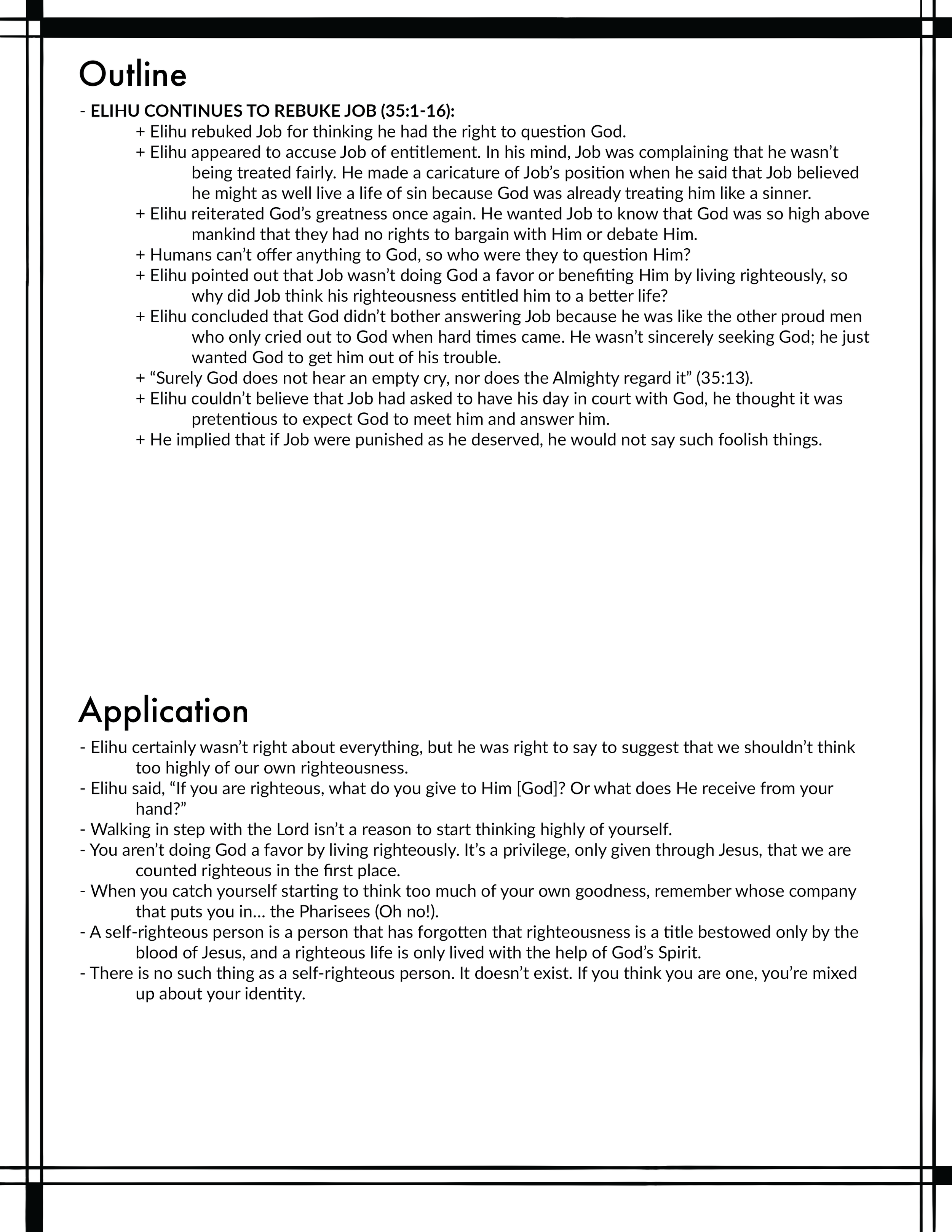Job 35 Summary - 5 Minute Bible Study
Job 35 Short Summary:
Elihu continues to rebuke Job in chapter 35, calling him entitled and pretentious for demanding answers from the God of the universe. He got some things right, but he got other things wrong. One thing he got wrong was his assessment of Job’s character. He, like Job’s 3 friends, couldn’t resist the assumption that Job was hiding secret sin, which led him to some very wrong conclusions.
Job 35 Bible Study
SHORT OUTLINE OF THE BOOK OF JOB
Job 1-2 – Job is Persecuted by Satan
Job 3-37 – Job and His Friends Discuss the Reason He is Experiencing Persecution
Job 38-41 – God Speaks with Job and Reveals His Greatness to Him.
Job 42 – God Restores What Job Lost
WHEN:
The date of the writing of Job is unknown and still debated. Some believe it was written during the time of the patriarchs (Abraham, Isaac, and Jacob) or even earlier, while others suspect it was written during the time of Judah’s Babylonian captivity (607-537 B.C.).
I take the earlier date. The description of Job as the “greatest of all the people of the east” (1:3) and an absence of references to Israel, Jerusalem, and the Temple suggests to me that this book was written early.
KEY CHARACTERS:
Job – A blameless and upright man who Satan persecuted in an attempt to turn his heart away from God.
Elihu – Elihu had been listening to the conversation between Job and his friends. He speaks and shares his opinions in chapters 32-37. He was the youngest of the group. His father was Barachel the Buzite, of the family of Ram (32:2).
WHERE:
Job lived in the land of Uz. Most scholars surmise the land of Uz was in northern Saudi Arabia, either immediately south of the Dead Sea, I the land that would become known as Edom, or immediately east of the Dead Sea, which is today the country of Jordan.
OUTLINE:
ELIHU CONTINUES TO REBUKE JOB (35:1-16):
Elihu rebuked Job for thinking he had the right to question God.
Elihu appeared to accuse Job of entitlement. In his mind, Job was complaining that he wasn’t being treated fairly. He made a caricature of Job’s position when he said that Job believed he might as well live a life of sin because God was already treating him like a sinner.
Elihu reiterated God’s greatness once again. He wanted Job to know that God was so high above mankind that they had no rights to bargain with Him or debate Him.
Humans can’t offer anything to God, so who were they to question Him?
Elihu pointed out that Job wasn’t doing God a favor or benefiting Him by living righteously, so why did Job think his righteousness entitled him to a better life?
Elihu concluded that God didn’t bother answering Job because he was like the other proud men who only cried out to God when hard times came. He wasn’t sincerely seeking God; he just wanted God to get him out of his trouble.
“Surely God does not hear an empty cry, nor does the Almighty regard it” (35:13).
Elihu couldn’t believe that Job had asked to have his day in court with God, he thought it was pretentious to expect God to meet him and answer him.
He implied that if Job were punished as he deserved, he would not say such foolish things.
APPLICATION
Elihu certainly wasn’t right about everything, but he was right to say to suggest that we shouldn’t think too highly of our own righteousness.
Elihu said, “If you are righteous, what do you give to Him [God]? Or what does He receive from your hand?”
Walking in step with the Lord isn’t a reason to start thinking highly of yourself.
You aren’t doing God a favor by living righteously. It’s a privilege, only given through Jesus, that we are counted righteous in the first place.
When you catch yourself starting to think too much of your own goodness, remember whose company that puts you in… the Pharisees (Oh no!).
A self-righteous person is a person that has forgotten that righteousness is a title bestowed only by the blood of Jesus, and a righteous life is only lived with the help of God’s Spirit.
There is no such thing as a self-righteous person. It doesn’t exist. If you think you are one, you’re mixed up about your identity.

